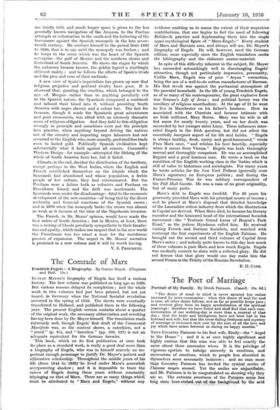are, briefly, told, and much longer space is given to
the less generally known navigation of the _ Amazon, to the Puritan attempts at colonisation in the south and the battering of the buccaneers against the Spanish monopoly in the late seven- teenth century. lie confines himself to the period from 1492 to 1690, that is to say until the monopoly was broken ; and he keeps to the scene which was the heart of the Spanish enterprise—the gulf of Mexico and the northern shores and hinterland of South America. He shows the stages by which the unknown became known, the golden legend a startlingly different reality ; and he follows the efforts of Spain's rivals and the pros and cons of their methods.
A new view of Spain's imperialism has grown up now that religious prejudice and political rivalry have gone. It is observed .that, granting the cruelties, which belonged to the age- cf. Morgan—rather than to anything peculiarly evil in the Spanish nature, the Spaniards conquered a continent and infused their blood into it, without providing South America with negro slavery and a colour bar. The lust for treasure, though it made the Spaniards great adventurers and poor economists, was allied with an intensely dramatic sense of religious obligation. And they held to this obligation strongly in principle and sometimes even put the principle into practice, when anything beyond driving the natives out of the country and importing negro labourers had not occurred to the English who, more soundly, preferred free trade even to looted gold. Politically Spanish civilisation kept substantially what it held against all corners. Cromwell's Western Design—for example—attempted the filching of the whole of South America from her, but it failed.
Climate, in the end, decided the distribution of the territory, except perhaps in the West Indies, where the English and French established themselves on the islands which the Spaniards had abandoned and whose population, a feeble people of low culture, they had exterminated. But the Puritans were a failure both as colonists and Puritans on Providence Island, and the drift was northwards. The Spaniards were under the disadvantage—fatal to the economic development of the new countries—of being tied by the direct authority and financial exactions of the Spanish crown ; and in 1670 when the monopoly broke the crown was almost as weak as it became at the time of the Napoleonic invasion.
The French, in Mr. Means' opinion, would have made the
best rulers of South America ; but in Mexico, at least, there was a mixing of bloods peculiarly sympathetic in their fanatic- ism and apathy, which makes one suspect that in the new world the Frenchman was too exact a man for the murderous passion of expansion. The sequel to Mr. Means' narrative is promised in a new volume and it will be worth having.
V. S. PRITCHETT.










































 Previous page
Previous page